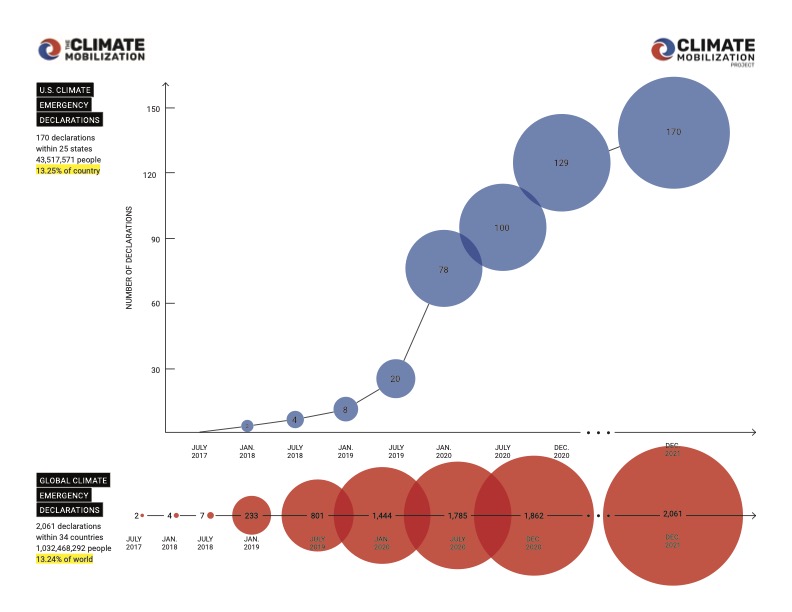
San Francisco declares a Climate Emergency
On April 2, San Francisco Supervisors unanimously passed a resolution sponsored by Supervisor Rafael Mandelman declaring a Climate Emergency. This resolution is the result of the efforts of local activists and sets the stage for accelerated action to reduce the city’s emissions at emergency speed.
The resolution commissions a technical report from city staff and calls for a public hearing to discuss strategies for deep emissions reductions.
The groups championing this resolution include SF Tomorrow, Bayview Hunters Point Community Advocates, Mothers Out Front, 350 Bay Area, 350 SF, Citizens’ Climate Lobby SF, Sierra Club SF Group, SF Labor Council, SEIU 1021, Jobs with Justice, and others.
In passing this resolution, San Francisco joins other major metropolitan cities including Los Angeles, Vancouver, Canada and London, England in advancing the Climate Emergency Movement.
As a result of the leadership and collaboration of established community and labor groups, in consultation with resolution sponsor Supervisor Rafael Mandelman, the final resolution includes a strong focus on environmental justice, the central role of organized labor, and support for frontline communities in the transition to a fossil fuel-free economy:
Be it resolved […] That labor unions and frontline environmental justice communities must be equitably and actively engaged in the City’s transition to a fossil-fuel free economy and prioritized through local climate mitigation and adaptation planning, policy, and program delivery, ensuring a just transition for all people; and, be it
Further resolved, That any legislation or projects started through the climate emergency process should consider union career opportunities, including training and retraining, and investments in working-class, low-income communities, and communities of color historically and disproportionality impacted by pollution, high unemployment, poverty and environmental injustice; and, be it
Further resolved, That as the City works on climate mitigation, it shall continue to advance climate adaptation efforts to address unavoidable current and future climate change impacts; and, be it
Further resolved, That the Board of Supervisors will work with the Mayor’s office, the Controller, and the Capital Planning Committee to develop a budget that enables urgent climate action, avoids further investment of public dollars in fossil-fuel reliant infrastructure when there are clean energy alternatives, supports public sector employees, and ensures a climate resilient future for all San Franciscans.
The full text of the San Francisco resolution is available here.
San Francisco becomes the largest city in the region to declare climate emergency, joining Berkeley, Richmond, Oakland, Alameda, Hayward, and Fairfax in a growing regional coalition of cities set on a just transition and climate action at emergency speed in one of the most innovative and also most economically stratified regions in the world.
Along with the state’s legacy of environmental advancement, the success of this regional declaration effort, combined with the momentum to build the world’s first Climate Emergency Mobilization Department within the City of Los Angeles, puts California in a leadership position as the Climate Emergency Movement develops and grows.
In the face of climate shocks, Chico California declares a Climate Emergency
On April 2, Chico, California joined the growing Climate Emergency Movement. In a five-to-one vote, the Chico City Council adopted a resolution “Declaring a Climate Emergency, Requesting Regional Collaboration on an Immediate Just Transition and Initiating an Emergency Mobilization Effort to Restore a Safe Climate,” which includes a commitment to “eliminating citywide greenhouse gas emissions as quickly as possible and no later than 2030.”
Led by 350 Chico, this efforts was bolstered by people who lost their homes in recent fires and dedicated their time and energy to this effort. Local groups supporting this resolution include the Butte Environmental Council, Chico Peace and Justice Center, Butte County NAACP, Democratic Action Club of Chico, North Valley Housing Trust, Women On Reproductive Defense, Yahi Group of Sierra Club, The Women’s March on Chico, Chico Community Guilds, Unitarian Universalist Fellowship in Chico, Stonewall Alliance of Chico, Chico DSA, Mobilize Chico, Butte County Health Care Coalition, Northstate Labor Federation, and the AFL-CIO.
The resolution includes key commitments such as:
-
Establishing a staff supported “Climate Emergency Commission with a diverse and inclusive representation of residents;”
-
Commitment to a Just Transition through the creation of “jobs which guarantee good pay and comprehensive benefits;”
-
and deliberative democracy, which underscores the need for full community participation, inclusion, and support to plan and implement these measures.
The full text of the Chico resolution is available here.
The calls from the community to declare Climate Emergency were supported by the evidence on the ground.
The region has been wracked by severe climate shocks in recent years—the Chico metropolitan area includes the town of Paradise, which was decimated by the Camp Fire in November of last year, which claimed 85 lives and burned over 18,000 structures, becoming California’s most deadly fire to date. Thousands of residents were displaced, many moving to the city of Chico itself.
In 2017 the Oroville Dam, the tallest dam in the U.S., which is located in the area, came dangerously close to failure after the wettest winter in 100 years degraded the dam’s main spillway, and forced the use of the unpaved emergency spillway. This led to an incredibly tense emergency evacuation of the towns downstream, as residents watched to see if their entire community would be flooded—luckily the rains subsided enough to get ahead of the flow and repair the spillway.
36 speakers attended Tuesday’s meeting to weigh in on the resolution, with the vast majority in support. In what attendees took as a sign of the significance of the vote the meeting was forced to adjourn early because of a severe hail storm and flooding risk.

















